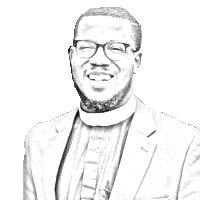Three years ago, the killing of nine black worshippers at Emanuel African Methodist Episcopal Church in Charleston, S.C., created outrage and fear in the black community. Now, as the country mourns another pair of hateful attacks — this time in Jeffersontown, Ky., and Pittsburgh — the country can be tempted to despair.
These three attacks were conducted by individuals with disturbing racial biases who resorted to violence as a means of furthering their bigoted agendas. These attacks are meant to divide our country along the lines of race and identity, creating an environment in which anger, fear and despair dominate the lives of ordinary citizens.
We are left wondering what to do in the face of violence. We may be tempted to join the chorus of voices that would drive us apart or to view those on the political right and left as our enemies. Human nature may drive us to use degrading language and caricature those with whom we disagree.
Instead, we must rise to the occasion as our Jesuit values call us to become “people for others.” To be people for others is to have faith in one another, to value the dignity and worth of all we encounter, and to cherish the gift that is our diversity.
We can live the complexity of diversity in our ordinary lives by building friendships with those in our classes who may hold varying political opinions, visiting the worship service of a religious tradition with which we are not affiliated, and seeking to understand the experiences of those who hold marginalized identities on our campus.
One of the profound gifts I have been given as a campus chaplain is the opportunity to work with and befriend those who share different ethnic, religious and political identities than my own. These relationships cause me to not only learn more from others but also grow within myself.
To become people for others is an act not of self-glorification but rather humility. We must be humble to put down our fear and enter each other’s narratives. We must be humble to listen to someone’s story of being discriminated against for their identity. We must be humble to engage in genuine, vulnerable relationships and allow them to transform us.
Here on the Hilltop, we reflect the glorious array of human difference. Our Georgetown University community is composed of a wide array of racial and ethnic identities, sexual orientations, and religious and non-religious identities. Georgetown is a microcosm of the world around us, and in our common lives we can be tempted to embrace the clanging cymbals of discord in the world around us that emphasize rage. Or we can stand firm in the beliefs that love casts out fear and that being people for others is a call to love.
The late Rev. Forrest Church, a Unitarian minister in New York City, once wrote, “Hate is not love’s opposite, fear is. When we are frightened — by others, by life itself — we cannot love. We can hide. We can fight. But we cannot love. Conversely, love casts out fear.”
This task is difficult; it requires embracing uncertainty, nuance and humility. To become people for others requires introspection of the ways we hold onto narratives of others that are damaging, fear-based and grounded in our own sense of self-righteousness. To become a person for others is to become a person whose life is defined not by fear but by love.
Fear corrupts us by allowing our view of life to be based upon self-preservation that makes no room for the humanity of others. We witness this effect in our country’s political rhetoric and in racist and antisemitic violence. We cannot allow fear to hold the final word over our lives or our nation.
So, we face fear with love. We begin with the ordinary moments of life here on the Hilltop. We are called to love our neighbor so radically different from us, to love our classmates, roommates, resident assistants, professors, administrators, facilities staff, maintenance staff, bus drivers and dining staff who reflect the diversity of our country.
To love is easier said than done. Love is hard. Perhaps, begin with the small steps of asking a person with differing views to coffee rather than dismissing them in class. Enter into a respectful dialogue with peers who hold different perspectives. Attend an event hosted by the Center for Multicultural Equity and Access, the Black House, Casa Latina, the Center for Social Justice, the Center for Jewish Civilization or Campus Ministry.
To embrace differences is difficult. But as we used to sing in my church in Georgia: “If I can help somebody as I pass along / Then my living shall not be in vain.” Let us on the Hilltop become known not simply for our intellectual abilities or athletic prowess but for being people for others.
Rev. Brandon Harris is the Protestant chaplain to the Law Center and Main Campus. Interfaith Insights is a series of Viewpoints written by chaplains at Georgetown University.














